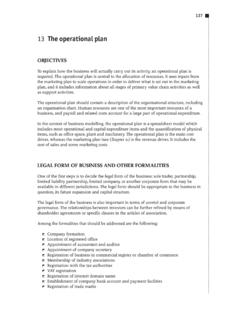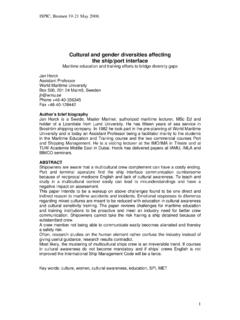Transcription of Cross-Cultural Management: How to Do Business …
1 Cross-Cultural management : How to Do Business with Germans- A Guide -Aksana KavalchukDeutsche Gesellschaft f rInternationale Zusammenarbeit (GIZ) GmbHFriedrich-Ebert-Allee 4053113 BonnT +49 228 4460-0F +49 228 4460-1766I Kavalchuk - How to Do Business with GermansDeutsche Gesellschaft f rInternationale Zusammenarbeit (GIZ) GmbHFriedrich-Ebert-Allee 40 53113 BonnGermanyT +49 228 4460-1227 F +49 228 4460-1333 E I German understanding of the and as thoroughness and desire for and Separation of spheres of German love of order452 Features of the German Business communication style543 The first and rules of and speeches724 How Germans negotiate General agreement843 Contents5 The project, German planning of tasks and the work process to do in crisis situations and when problems role of the Project Manager and communication in a project 926 How Germans behave in conflict of in conflict resolution strategies99 Appendix105 List of References105 The German soul reflected in proverbs and sayings106 German holidays108 For those who'd like to learn more110 Internet resources111 ForewordForewordGermany is a key player in international economic relations.
2 As the second largest exporter of goods and the fourth biggest economy world-wide, Germany is strongly oriented towards foreign trade. Products Made in Germany enjoy an excellent reputation worldwide. Cars, ma-chinery and electronics from Germany are in demand around the globe, and a great many innovative products are developed by small and medium-sized enterprises (SMEs). Around 1,500 highly specialised German SMEs are the world market leaders in their field of expertise. There are, therefore, a great many good reasons to do Business with German companies. For this to be a success, familiarity with the German Business culture is utterly crucial. Only when the foreign entrepreneur knows how German companies work, how German executives negotiate, and what is expected of foreign partners can they also successfully co-operate with a German partner in the long handbook aims to give foreign executives some initial insight into German Business practices and to make them aware of the peculiarities of the local Business life.
3 In short: it provides an introduction to How to do Business with Germans , with a wealth of suggestions for the reader. This handbook undoubtedly does not attempt to answer all questions pertaining to German Business culture. On the one hand, intercultural management itself is a complex topic, which is characterised by psy-chological, social, economic and historic factors; on the other hand, ne-cessity calls for generalisations at many places in this book. Genera-lisations are always problematic however, as the multifaceted nature of reality cannot be depicted. The considerable cultural differences within Germany are also ignored here:Between the protestant north and catholic south;Between East and West Germany, which were separated by an Iron Curtain for over 40 years;Between economically prosperous and rather under-developed regions;nnnnnnnnnnnnnnnnnnnnnnnnnnnnnnnn nnnnnnnnnn5 ForewordBetween the many regional cultures differentiated between through their various dialects or regional cuisine;Between rural and urban areas;Between the different socio-economic milieu whose economic beha-viour is so very different;And ultimately also between individuals, as no one person is like any the differences between the different types of companies and cul-tures within these can be covered.
4 The German corporate landscape is varied: while there are large companies with tens of thousands of em-ployees around the globe, there are also medium-sized companies owned by families or already listed on the stock exchange. And then there are young and innovative companies that have been around for just a few years, companies with a century-long history, entrepreneurs, trade com-panies, scientific-industrial service providers, subsidiaries of foreign companies, etc. Their company cultures, management styles and per-sonnel management concepts are accordingly this book cannot cover this diversity in full but this is also intentional. It deliberately generalises, aiming to enhance awareness of both the aspects in common with and particular to the German Business world. The boundaries of clich are therefore fluid; exceptions are inten-tionally excluded from this book and abstraction sacrificed. The perspec-tive adopted is also intentional: it is a view from the outside looking into Germany.
5 The author with Russian-Ukrainian roots allows herself to be guided by the question of how an outsider perceives Germany and the German Business culture. In doing so, she makes use of her excellent knowledge of the German Business culture. As an intercultural manage-ment specialist, she has trained native and foreign executives for many years handbook is therefore an excellent resource for participants in the Manager Training Programme of the Federal Ministry of Economics and Technology (BMWi), which prepares them for their stay in Germany. Our 6experience gathered over the years of running this programme has shown us that demand is high among executives from Eastern Europe and Asia. The practice-oriented intercultural literature for this target group is extremely limited however. This book in a modular format should now close this Deutsche Gesellschaft f r Internationale Zusammenarbeit (GIZ) GmbH has been running the BMWi Manager Training Programme since 1998 initially as the Carl Duisberg Gesellschaft and later as InWEnt Capacity Building International.
6 According to the motto of Fit for Part-nership with Germany , it prepares executives from Eastern Europe and Asia for Business relations with German book was prepared on the initiative of the GIZ with funding from the German Federal Ministry of Economics and Technology (BMWi). The con-tent reflects the author's personal GIZ would like to thank Aksana Kavalchuk for her professionalism and the outstanding commitment with which she participated in this book project. We would also like to thank all those involved for their contri-butions to the handbook particularly Sujata Banerjee, who contributed her scientific and editorial expertise for the English-language version of the handbook, and reviewers Anna Suchkova, Valeriy Bessarab and Michael wish all readers a thoroughly enjoyable, hopefully at times entertain-ing read! May your Business activities with German companies be a re-sounding Gerd Schimansky-GeierHonorary Professor of SPbSPU in Saint Petersburg and IPA "Turan-Profi" in AstanaHead of the Manager Training Programme of the Federal Ministry of Economics and Technology 7 Foreword9 PrefacePrefaceThis book is dedicated to my son Philipp,who unites Russian, Ukrainian, German and Austrian would like to believe that this particular mixture will make him happy!
7 The processes of globalization in today's world have brought about a rapid in-crease in contact among representatives of different cultures. The wide variety of values, attitudes and mindsets we encounter in a global world, the diversity of ap-proaches to solving management tasks, various leadership styles and different ways of social interaction excite, amaze and enrich everyone who "plays on the international field".This very diversity, which we cannot always see, much less understand and inter-pret, places increased demands on the individual, on his/her ability to survive under the new diversity conditions. It is no great surprise that in many cases peo-ple want to simplify the increasingly complex world around them. This is where stereotypes come to our aid: Americans are superficial , the British are arro-gant , Germans are pedantic and boring . cultural differences may spur certain positive outcomes in the course of coopera-tion.
8 If, however, they go unrecognized or are not sufficiently taken into account, these differences can cause difficulties and conflicts in Business relations with partners from other cultures. The challenge of relations between different cul-tures is particularly acute in Business communication: about one third of all inter-national projects suffer to a considerable extent precisely from a lack of cultural more often you encounter various culturally determined approaches and styles of doing Business , the more profoundly you will get to know the peculiarities of your own national culture, and the more acutely you will feel your own limita-tions and the wish to overcome them. Communicating with people from other cul-tures, especially in a Business context, enables you to get a sense for the relative nature of value orientations and prevents us from asserting the absolute advant-age of one or another tradition over others, for example, in issues of staff manage- 10ment, communication style, negotiation strategy, etc.
9 Expanding our hori-zons in this way results in a wider repertoire of competencies, manage-ment and negotiation skills, which undoubtedly will lead to greater suc-cess, not only in international cooperation, but equally in one's 'native' Business will benefit from this Guide? This publication was primarily in-tended for participants of internships organised by the Deutsche Gesell-schaft f r Internationale Zusammenarbeit (GIZ) GmbH, within the frame-work of Russia's Presidential Programme, the Ukrainian Initiative and other management training programmes for executives from Azerbaijan, Belarus, China, India, Kazakhstan, Kyrgyzstan, Moldova, Mongolia, Turk-menistan, Uzbekistan and Vietnam. Th guide book will help our group of readers to proactively adjust to the specific nature of the German men-tality and in this way be better prepared for their stay in addition, this guide may also prove to be of interest to a wider circle of readers, first and foremost to members of the Business community who want to initiate, improve or expand their relationships with German com-panies, individuals who are employed by, or plan to go to work for/with German companies, and teachers of Comparative management , Inter- cultural Communication or Conduct of Negotiations courses, as well as German language will the reader find in this Guide?
10 This publication is based on the author's many years of experience working in Germany in interna-tional projects involving Germans, and also on observations related to internships of managers from various countries in Germany. At the core of this guide is an explanation of the behavioural standards of German Business people, their self-perception and value system, as well as those interpretation patterns which Germans use to read and assess the be-haviour of foreign partners. The guidebook attempts to explain the main structural characteristics of German Business culture, along with the wide-spread stereotypical perceptions of individual aspects of the German mentality that are relevant for an economic cooperation with Germany. Preface11 For a deeper understanding of these issues, the text provides additional material, placed i n s e p a r a t e i n s e r t s .Readers will encounter such topics as the German concept of professio-nalism and specific features of German Business communication.







